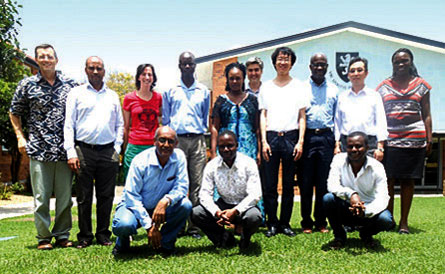Since adopting a one-size-fits-all approach in technology generation and dissemination is unlikely to bring positive results, it is necessary to understand what intervention works for whom, where, and how in order for a program to be successful. Developing farm household typologies to target technology with respect to farmers’ endowments and environmental setting is one of the key components of the SIMLESA (Sustainable Intensification of Maize and Legume Cropping Systems in Southern and Eastern Africa) initiative. To identify farm household typologies from baseline surveys carried out in Ethiopia, Kenya, Tanzania, Malawi, and Mozambique, the initiative organized a two-week workshop between November and December 2012 at the University of Queensland, Brisbane, Australia. The event was attended by economists from the five SIMLESA countries and organized by Daniel Rodriguez, leader of Queensland Australia component of the SIMLESA project.
The first week consisted of lectures by experts in household typologies and household modeling in developing countries, econometric modeling of adoption and impact (facilitated by Menale Kassie of CIMMYT and John Asfau of the University of Queensland), household survey data mining, and the use of survey data to parameterize household models. The participants then prepared and delivered brief presentations covering the objectives, research questions, and hypotheses of the key publications distributed among them; methods and main results; and implications of the publications to their own work.
Reflecting their respective survey datasets, the workshop participants then developed a methodology to identify farm household typologies and, subsequently, a new tool using the free R statistical software. The tool was distributed to each of the participants. The utilized approach not only automates the process, but also ensures that the same methodology is applied to each country’s survey dataset, thereby enabling an easier comparison of the results. The workshop was concluded by a short presentation from each participant outlining their findings.
The feedback on the workshop was very positive: many participants intend to instruct their colleagues in their home countries on the techniques they learned to use during the workshop. The Australian SIMLESA team will continue to provide support on the use of R, as well as access to the script to identify household typologies.

 Capacity development
Capacity development